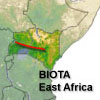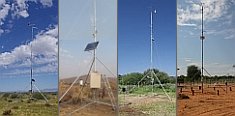 



Weather data
A large number of automatic weather stations has been implemented in the frame of the BIOTA AFRICA project by the Namibian National Botanical Research Institute (NBRI) and the Group "Biodiversity, Evolution and Ecology" (BEE) of the University of Hamburg. The website offers hourly updates of data and graphs of a large number of weather parameters.

|
 BIOTA East Africa - Workpackage(s)
BIOTA East Africa - Workpackage(s)
Subproject |
E15a - Capacity building in biodiversity information systems for animals and plants in East Africa |
Workpackage |
WP3: Capacity building and sustainable management of zoological BIOTA-East specimen- and observation data |
Project leader(s) |
Dr. Karl-Heinz Lampe, ZFMK Bonn
Dr. Siegfried Krause, GNM Nuremberg
Dr. Beatrice Khayota, NMK Nairobi |
Project description |
Project description: Capacity building measures at all levels of permanent personnel responsibilities - curators, technicians, volunteers, database- and IT-officers - are essential activities for the goals of E15. It will include the digitisation of BIOTA East Africa relevant key species of selected animals. E15a-WP3 include: - Capacity building in collection- & information management for curators, technicians and volunteers incl. quality management and digitisation of museums collections (set up of a specimen based collection database):
- Primary data capture by listing the systematic taxa with their storage place
- Validity check of the systematic information against a systematical catalogue
- Establishing a systematical catalogue by entering the updated systematic information including synonyms, hierarchy of taxa, authors, year, etc. into the database
- Secondary data capture by listing locations, collectors, determinators.
- Adding geographical attributes such as latitude, longitude and in a hierarchy such as province/area, state, country, continent/ocean and a link to the zoogeographical region
- Establishing a geographical catalogue by entering the information into the database like the previous lists
- Final data entry by using the previously formed catalogues and lists just by mouse clicking the information items that are needed.
- Adding images of types and other important specimens with original label information
- Standardization of image processing (form, size, calibration etc.)
- Guidelines for long term digital preservation of scientific information
- Geographical mapping of 50 BIOTA relevant key animal species by digitised geo-referenced specimens information
- Capacity building of database administrators in database management
|
Keywords |
capacity building, best practise, digitization workflow |
Contribution to
cross-cutting themes (CCT) |
- Monitoring and assessment of biodiversity in space and time (Theme1)
- Capacity building and information policy at local, national,and international levels (Theme5)
|
Link to Subproject |
E02
E03
E04
E11
E15b
|
|
|






 Go to the WeatherNet
Go to the WeatherNet BIOTA East Africa - Workpackage(s)
BIOTA East Africa - Workpackage(s)